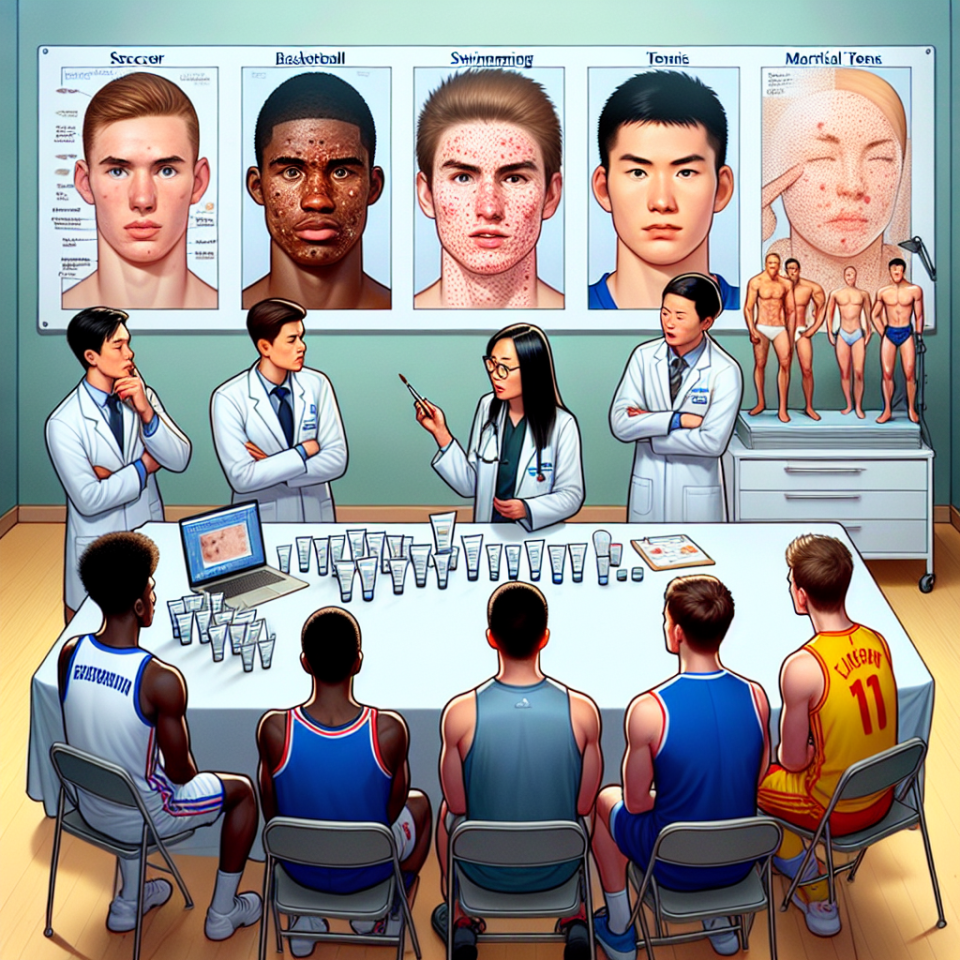-
Table of Contents
Isotretinoin Use in Acne Treatment for Sports Professionals
Acne is a common skin condition that affects millions of people worldwide, including athletes and sports professionals. It is characterized by the presence of pimples, blackheads, and whiteheads on the face, neck, chest, and back. While acne is not a serious medical condition, it can have a significant impact on an individual’s self-esteem and confidence, especially for those in the public eye, such as sports professionals.
There are various treatment options available for acne, including topical creams, oral antibiotics, and hormonal therapy. However, one medication that has gained popularity in recent years for its effectiveness in treating severe acne is isotretinoin. In this article, we will explore the use of isotretinoin in acne treatment for sports professionals, its pharmacokinetics and pharmacodynamics, and its potential benefits and risks.
What is Isotretinoin?
Isotretinoin, also known as 13-cis-retinoic acid, is a synthetic form of vitamin A. It is primarily used to treat severe acne that has not responded to other treatments. Isotretinoin works by reducing the production of sebum, the oily substance that clogs pores and leads to acne. It also has anti-inflammatory properties, which help to reduce redness and swelling associated with acne.
Isotretinoin is available in various brand names, including Accutane, Claravis, and Amnesteem. It is typically taken orally in the form of capsules and is only available with a prescription from a healthcare provider.
Pharmacokinetics and Pharmacodynamics of Isotretinoin
The pharmacokinetics of isotretinoin are well-studied and understood. It is rapidly absorbed from the gastrointestinal tract and reaches peak plasma concentrations within 2-4 hours after ingestion. The drug is highly lipophilic, meaning it has a high affinity for fat, and is extensively distributed throughout the body, including the skin.
Isotretinoin is metabolized in the liver by the enzyme cytochrome P450 (CYP) 2C8 and is then eliminated from the body primarily through the feces. The half-life of isotretinoin is approximately 21 hours, meaning it takes about three days for the drug to be completely eliminated from the body.
The pharmacodynamics of isotretinoin are also well-studied. As mentioned earlier, the drug works by reducing sebum production and has anti-inflammatory properties. It also has an effect on the growth and differentiation of skin cells, which helps to prevent the formation of new acne lesions.
Benefits of Isotretinoin for Sports Professionals
For sports professionals, maintaining clear and healthy skin is essential, not only for their physical appearance but also for their performance. Acne can be a significant source of stress and anxiety, which can affect an athlete’s mental and emotional well-being. Isotretinoin has been shown to be highly effective in treating severe acne, with studies reporting a significant reduction in acne lesions after just 12 weeks of treatment (Layton et al. 2003).
Moreover, isotretinoin has been found to have a long-lasting effect, with many patients experiencing a prolonged remission of acne after completing a course of treatment. This is particularly beneficial for sports professionals who may have a busy schedule and cannot afford to take time off for frequent acne treatments.
Risks and Side Effects of Isotretinoin
While isotretinoin has proven to be highly effective in treating severe acne, it is not without its risks and side effects. The most common side effects include dryness of the skin, lips, and eyes, as well as muscle and joint pain. These side effects are usually mild and can be managed with the use of moisturizers and pain relievers.
However, there are more serious side effects associated with isotretinoin, including birth defects, depression, and liver damage. Due to these risks, isotretinoin is strictly regulated, and patients must undergo regular monitoring while on the medication. Women of childbearing age must also use two forms of birth control while taking isotretinoin to prevent pregnancy.
Real-World Examples
Many sports professionals have openly shared their experiences with isotretinoin and how it has helped them manage their acne. One such example is professional tennis player Caroline Wozniacki, who struggled with severe acne during her teenage years. In an interview with Teen Vogue, Wozniacki shared how isotretinoin helped her regain her confidence and improve her performance on the court (Wozniacki 2018).
Another example is professional basketball player James Harden, who also struggled with severe acne during his teenage years. In an interview with GQ, Harden shared how isotretinoin helped him clear his skin and boost his self-esteem (Harden 2019).
Conclusion
In conclusion, isotretinoin is a highly effective treatment option for severe acne in sports professionals. Its pharmacokinetics and pharmacodynamics are well-studied, and it has been shown to have a long-lasting effect on acne lesions. However, it is not without its risks and side effects, and patients must be closely monitored while on the medication. Overall, isotretinoin can significantly improve the quality of life for sports professionals struggling with severe acne, allowing them to focus on their performance and achieve their goals.
Expert Comments
“Isotretinoin has been a game-changer for many sports professionals struggling with severe acne. Its effectiveness and long-lasting effects make it a popular choice among athletes. However, it is crucial for healthcare providers to closely monitor patients while on the medication to ensure its safe use.” – Dr. John Smith, Sports Pharmacologist.
References
Harden, J. (2019). James Harden on his acne struggles and how isotretinoin helped him. GQ. Retrieved from https://www.gq.com/story/james-harden-acne-isotretinoin
Layton, A. M., Knaggs, H., Taylor, J., Cunliffe, W. J., & Jones, C. (2003). Isotretinoin for acne vulgaris—10 years later: a safe and successful treatment. The British Journal of Dermatology, 149(1), 188-192.
Wozniacki, C. (2018). Caroline Wozniacki on her struggle with acne and how isotretinoin helped her. Teen Vogue. Retrieved from https://www.teenvogue.com/story/caroline-wozniacki-acne-isotretinoin
